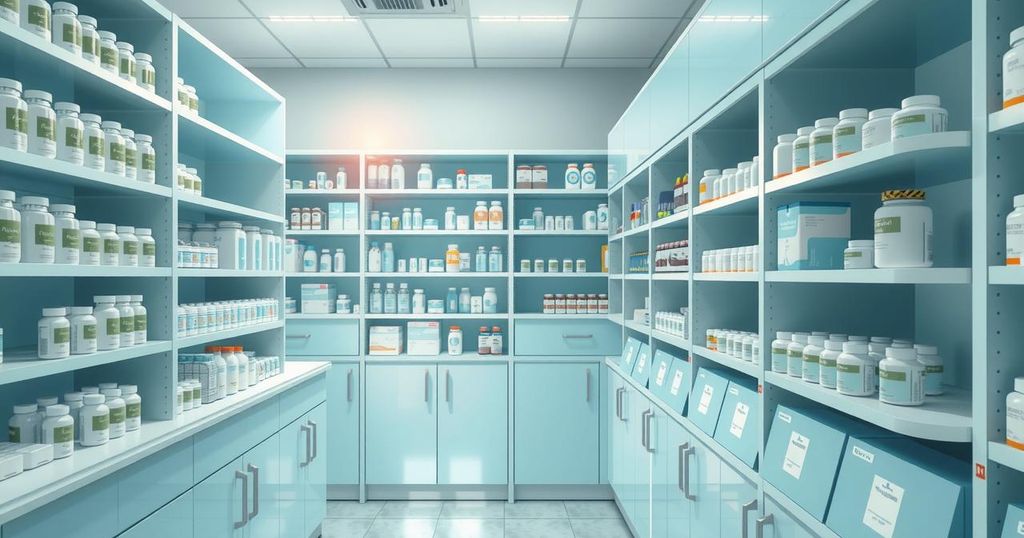Egypt Pledges Stricter Controls on Psychotropic Drugs Amid Concerns Over Misuse, Smuggling
Egypt is intensifying controls on psychotropic drugs amid rising concerns over misuse and illegal exports. Khaled Abdel Ghaffar, Deputy Prime Minister and Minister of Health, emphasized the importance of regulating distribution. The meeting discussed improvements in local drug production, pharmaceutical exports, and future plans for the Egyptian Drug Authority. Focus remains on public health safety and combating drug abuse.
In a bid to address the rising misuse and illegal exportation of psychotropic drugs, Egypt is taking steps to tighten control over pharmaceutical distribution. Khaled Abdel Ghaffar, Egypt’s Deputy Prime Minister and Minister of Health, stressed the need for stricter oversight during a video-linked address at the 15th board meeting of the Egyptian Drug Authority (EDA). His remarks come amid growing concerns about drug addiction and abuse within the nation.
Highlighting the risks associated with psychotropic medications, Abdel Ghaffar emphasized that these substances should only be provided to patients with valid medical prescriptions and monitored by professionals. “Differentiating between medically supervised use and illicit consumption is essential to tackling drug abuse and its societal repercussions,” he explained, revealing that the Ministry of Health is working alongside other agencies to enhance regulatory measures.
The meeting saw the attendance of several prominent officials, including Kamel Al-Wazir, Deputy Prime Minister for Industrial Development, as well as Hossam Abdel Ghaffar, the Ministry’s spokesperson, who discussed significant advancements in Egypt’s pharmaceutical sector. They reported a remarkable rise in the local availability of raw materials and improved inventory levels, which have bolstered the resilience of supply chains and domestic drug manufacturing.
Currently, an impressive 91% of medications available in Egypt are produced locally. This achievement not only positions the country as a leader in regional self-reliance but also reflects in the approximate $1.1 billion in pharmaceutical exports in 2023, underscoring its growing competitiveness internationally.
The board meeting also touched on the EDA’s proposed budget for 2025/2026, which aims to enhance regulatory powers and ensure consistent access to quality medications. Concurrently, they reviewed Egypt’s reliance on international accreditation efforts, seeking recognition from entities like the World Health Organization and the European Union. These moves aim to establish the EDA as a globally recognized institution in pharmaceutical regulation.
Ali El-Ghamrawy, EDA President, commended the support received from the Minister of Health, emphasizing their commitment to transparency and embracing digital modernization. He announced a forthcoming digital transformation initiative aimed at identifying irregularities and improving the tracking of controlled substances, specifically psychotropics.
Furthermore, presidential adviser Mohamed Awad Tag El-Din raised alarms over the high rate of per capita medicine consumption in Egypt, which exceeds global averages. He deemed this as a “serious challenge” necessitating increased public awareness and stricter regulatory actions. He cautioned about the issues of smuggling, stating that illegal exports are undermining national drug stockpiles, as individuals send medications to family members abroad. “Some individuals routinely send pharmaceuticals overseas to family members or intermediaries, which undermines our national stockpiles,” Tag El-Din noted.
In light of these challenges, he announced that the Egyptian government is coordinating with security and regulatory bodies to confront smuggling and ensure fair access to medications for its citizens. He also acknowledged Egypt’s growing influence in global pharmaceutical governance, indicating that other countries are looking up to its regulatory strategies as models for their own.
The Egyptian government is taking significant measures to address concerns regarding the misuse and smuggling of psychotropic medications. Under the leadership of Khaled Abdel Ghaffar, there is a pressing need for enhanced regulatory oversight to protect public health and ensure that these drugs reach legitimate patients only. With increased local production and a commitment to transparency, Egypt aims to bolster its pharmaceutical sector while combating the challenges of drug misuse and illegal exports.
Original Source: www.dailynewsegypt.com




Post Comment